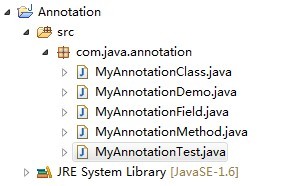首先什么是注解?
最常见的是,在我们使用Eclipse等工具编写java代码的时候,有时候会出现一些比如@Deprecated,@Override,@SuppressWarnings等东东。这个就是常见的几种注解。
在开发Java程序,尤其是Java EE应用的时候,总是免不了与各种配置文件打交道。以Java EE中典型的S(pring)S(truts)H(ibernate)架构来说,Spring、Struts和Hibernate这 三个框架都有自己的XML格式的配置文件。这些配置文件需要与Java源代码保存同步,否则的话就可能出现错误。而且这些错误有可能到了运行时刻才被发 现。把同一份信息保存在两个地方,总是个坏的主意。理想的情况是在一个地方维护这些信息就好了。其它部分所需的信息则通过自动的方式来生成。JDK 5中引入了源代码中的注解(annotation)这一机制。注解使得Java源代码中不但可以包含功能性的实现代码,还可以添加元数据。注解的功能类似 于代码中的注释,所不同的是注解不是提供代码功能的说明,而是实现程序功能的重要组成部分。Java注解已经在很多框架中得到了广泛的使用,用来简化程序 中的配置。
而我们最常见的可能就是上面提到的这三个注解了,简单的介绍一下上面的这三个注解的作用:
1、@Override:只能用在方法之上的,用来告诉别人这一个方法是改写父类的。
2、@Deprecated:建议别人不要使用旧的API的时候用的,编译的时候会用产生警告信息,可以设定在程序里的所有的元素上.
3、@SuppressWarnings:这一个类型可以来暂时把一些警告信息消息关闭.
在jdk自带的java.lang.annotation包里,打开如下几个源文件:
1Target.java
2Retention.java
3RetentionPolicy.java
4ElementType.java
1@Documented
2@Retention(RetentionPolicy.RUNTIME)
3@Target(ElementType.ANNOTATION_TYPE)
4public @interface Target {
5 ElementType[] value();
6}
1@Documented
2@Retention(RetentionPolicy.RUNTIME)
3@Target(ElementType.ANNOTATION_TYPE)
4public @interface Retention {
5 RetentionPolicy value();
6}
1public enum RetentionPolicy {
2 SOURCE,
3 CLASS,
4 RUNTIME
5}
1public enum ElementType {
2 TYPE, FIELD, METHOD, PARAMETER, CONSTRUCTOR,
3 LOCAL_VARIABLE, ANNOTATION_TYPE,PACKAGE
4}
在设计annotations的时候必须把一个类型定义为@interface。我们需要注意的是:SOURCE,CLASS 和 RUNTIME.这三个级别。
SOURCE代表的是这个Annotation类型的信息只会保留在程序源码里,源码如果经过了编译之后,Annotation的数据就会消失,并不会保留在编译好的.class文件里面。
ClASS的意思是这个Annotation类型的信息保留在程序源码里,同时也会保留在编译好的.class文件里面,在执行的时候,并不会把这一些 信息加载到虚拟机(JVM)中去.注意一下,当你没有设定一个Annotation类型的Retention值时,系统默认值是CLASS.
RUNTIME,表示在源码、编译好的.class文件中保留信息,在执行的时候会把这一些信息加载到JVM中去的.
@Target里面的ElementType是用来指定Annotation类型可以用在哪一些元素上的.说明一下:TYPE(类型), FIELD(属性), METHOD(方法), PARAMETER(参数), CONSTRUCTOR(构造函数),LOCAL_VARIABLE(局部变量), ANNOTATION_TYPE,PACKAGE(包),其中的TYPE(类型)是指可以用在Class,Interface,Enum和 Annotation类型上.
另外,@Target自己也用了自己来声明自己。如果一个Annotation类型没有指明@Target使用在哪些元素上,那么它可以使用在任何元素之上,这里的元素指的是上面的八种类型.
举几个正确的例子:
1@Target(ElementType.METHOD)
2@Target(value=ElementType.METHOD)
3@Target(ElementType.METHOD,ElementType.CONSTRUCTOR)
@Documented的目的就是让这一个Annotation类型的信息能够显示在javaAPI说明文档上;没有添加的话,使用javadoc生成API文档的时候就会找不到这一个类型生成的信息.
另外一点,如果需要把Annotation的数据继承给子类,那么就会用到@Inherited这一个Annotation类型.
本文只是简单的说了一下注解的常规用法,至于更加深入的注解学习,请参见文章末尾的参考资料。下面我们来看自定义一个注解:源代码有如下几个:

源码分别为:
1package com.java.annotation;
2
3import java.lang.annotation.ElementType;
4import java.lang.annotation.Retention;
5import java.lang.annotation.RetentionPolicy;
6import java.lang.annotation.Target;
7
8/**
9 * 类注解
10 * */
11@Retention(RetentionPolicy.RUNTIME)
12@Target(ElementType.TYPE)
13public @interface MyAnnotationClass {
14 public String msg();
15}
1package com.java.annotation;
2
3import java.lang.annotation.ElementType;
4import java.lang.annotation.Retention;
5import java.lang.annotation.RetentionPolicy;
6import java.lang.annotation.Target;
7
8/**
9 * 方法注解
10 * */
11@Retention(RetentionPolicy.RUNTIME)
12@Target(ElementType.METHOD)
13public @interface MyAnnotationMethod {
14 public String common();
15}
1package com.java.annotation;
2
3import java.lang.annotation.ElementType;
4import java.lang.annotation.Retention;
5import java.lang.annotation.RetentionPolicy;
6import java.lang.annotation.Target;
7
8@Retention(RetentionPolicy.RUNTIME)
9@Target(ElementType.FIELD)
10public @interface MyAnnotationField {
11 boolean request();
12}
1package com.java.annotation;
2
3@MyAnnotationClass(msg = "这个是一个类注解")
4public class MyAnnotationDemo {
5
6 public MyAnnotationDemo() {
7 }
8
9 public MyAnnotationDemo(String hello) {
10 this.hello = hello;
11 }
12
13 @MyAnnotationMethod(common = "这个是一个方法注解")
14 public void method() {
15 System.out.println(hello);
16 }
17
18 @MyAnnotationField(request = true)
19 private String hello;
20}
1package com.java.annotation;
2
3import java.lang.reflect.Field;
4import java.lang.reflect.Method;
5
6public class MyAnnotationTest {
7 public static void main(String[] args) {
8 MyAnnotationDemo demo = new MyAnnotationDemo("hello rollen");
9 MyAnnotationClass annotationClass = demo.getClass().getAnnotation(MyAnnotationClass.class);
10 System.out.println(annotationClass.msg());
11
12 Method method = null;
13 try {
14 method = demo.getClass().getMethod("method",new Class[0]);
15 } catch (SecurityException e) {
16 e.printStackTrace();
17 } catch (NoSuchMethodException e) {
18 e.printStackTrace();
19 }
20 MyAnnotationMethod annotationMethod = method.getAnnotation(MyAnnotationMethod.class);
21 System.out.println(annotationMethod.common());
22
23 Field field = null;
24 try {
25 field = demo.getClass().getDeclaredField("hello");
26 } catch (SecurityException e) {
27 e.printStackTrace();
28 } catch (NoSuchFieldException e) {
29 e.printStackTrace();
30 }
31 MyAnnotationField annotationField = field.getAnnotation(MyAnnotationField.class);
32 System.out.println(annotationField.request());
33
34 }
35}




 支付宝扫一扫打赏
支付宝扫一扫打赏  微信扫一扫打赏
微信扫一扫打赏 




